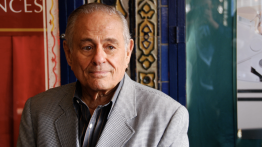In Memoriam: Maurice Kanbar
POSTED ON: August 29, 2022

Inventor and philanthropist Maurice Kanbar passed away on Saturday, August 20, leaving an extraordinary legacy of ingenuity and generosity. Like Peter Cooper, Mr. Kanbar was a rare combination of creative thinker and apt businessman. Although not a Cooper alumnus, he recognized the school as a place that encourages students to investigate their passions with rigor, which is exactly how he lived his life, gleaning enormous pleasure from applying his knowledge to problem solving. In a 2003 interview, he told At Cooper magazine, “To me, little problems are everywhere in life, so opportunities are everywhere. Invention is everywhere. It’s a wonderful way to occupy your mind.”
The Cooper Union was fortunate enough to receive a $10 million gift from Mr. Kanbar in 2002 to establish the Maurice Kanbar Center for Biomedical Engineering as well as a scholarship endowment and the Michael Ebert Endowed Fund for Patent Applications. It is the largest gift from an individual that Cooper has ever received; it’s far-reaching effects on faculty and students who conduct advanced bioengineering research have been similarly abundant.
Researchers at the Kanbar Center have investigated important topics to help advance health care, from orthopedic biomechanics related to obstructive sleep apnea, to medical imaging, biomedical devices, tissue engineering, and minimally invasive surgery, among other subjects. Jiwoon Park, who earned her bachelor’s and master’s degrees in chemical engineering, wrote a thesis on ways to use CRISPR-Cas9, a state-of-the-art technology available at the Kanbar Center, to look for differences in liver cells that could potentially signal disease. Mechanical engineer Anthony Simonetti built a “phantom,” i.e., model, of a human upper respiratory system to test the accuracy of magnetic resonance imaging thanks to the research capabilities of the center. Over the years, this pioneering work done by many students and faculty has led to collaborations with researchers at major area hospitals, broadening the impact of the center.
To date, 38 students have received more than $1 million in scholarship funding thanks to his generosity. They have included students from all three of Cooper’s schools: Fatima Kaniz, who graduated from the School of Art in May, used her time at Cooper to work toward a career in animation thanks to the Kanbar Scholarship; 2022 general engineering graduate Brandon Bunt found that his scholarship let him pursue a wide range of important extracurricular activities such as working as a STEM Teaching Fellow to mentor high school students and developing an invention to save water using a simple faucet attachment; Geovanna Septimio Landivar, a first-year student in the Irwin S. Chanin School of Architecture, said that, thanks to her Kanbar Scholarship, “I will be able to devote more time to my studies this year without needing to take out another student loan.”; Cerena Parkinson, junior in the School of Art, noted that the Kanbar Scholarship let her parents focus on saving money for her younger sisters’ education; and Michael Chan, a 2021 graduate in chemical engineering, chose to attend Cooper on a Kanbar Scholarship because it “is a unique place...it puts you in a position where you can gain real experience building awesome projects while still being a student,” a sentiment that Mr. Kanbar would have appreciated.
Mr. Kanbar, who held over 50 patents, grew up in the Boro Park neighborhood of Brooklyn, attended New Utrecht High School and Philadelphia Textile Institute, and had his first major business success at 21 selling his lint removal invention, D-Fuzz-It, which earned $200,000 in its first year on the market. His later inventions ran the gamut of his interests, from medical devices to games.
In 1972, he and his brother Elliott started the first multiplex theater in the United States, the Quad Cinema in Greenwich Village. Known for his support of independent filmmakers, he himself went on to produce several movies.
His greatest business success came with his invention of SKYY vodka, for which he devised a distillation and filtration process that removed impurities from the alcohol to minimize next-day headaches. He named the product for the brilliant azure skies of San Francisco, his adopted home.
But it’s fair to say that his philanthropy was as far reaching as his inventions with generous gifts not only to The Cooper Union but also to New York University for the Maurice Kanbar School of Film & Television; the Kanbar College of Design, Engineering & Commerce at Philadelphia University (now Thomas Jefferson University); the Marcus National Blood Center in Ramla, Israel; and the Hebrew Immigrant Aid Society (HIAS); among other institutions.
Professor of mechanical engineering and Maurice Kanbar Center Associate Director David Wootton said, “For the past two decades, the center has been a place where students from all engineering disciplines, and sometimes art and architecture, can focus on bioengineering research and innovation. The gift assured that a dedicated technician supports students with hands-on training and mentorship, and that biology and bioengineering courses often include a laboratory component.” He noted that many Cooper alumni who worked and learned in the Kanbar Center have gone on to careers in the biomedical sector and graduate programs in bioengineering, medicine, dentistry, and nursing. In addition, it has supported several successful grant applications to the National Science Foundation, National Institutes of Health, and attracted other generous gifts from other donors.
Maurice Kanbar’s extraordinary gift has had an ever-expanding impact on the college and the field of bioengineering, a full 20 years after the inventor and businessman chose to support this important work at The Cooper Union. In that same 2003 interview, Mr. Kanbar’s life’s work as an inventor, entrepreneur, and philanthropist was compared to Peter Cooper’s own interests. “I grew up being taught you have a responsibility in life to help others and give what you can.” The Cooper Union is incredibly grateful for Mr. Kanbar’s generosity, carrying philanthropy forward from our founder to the next generation.




